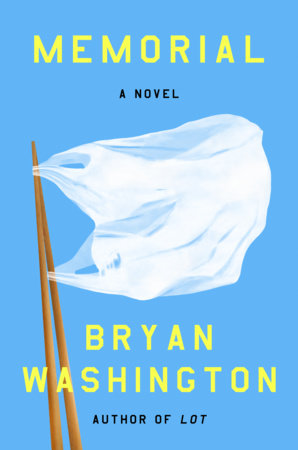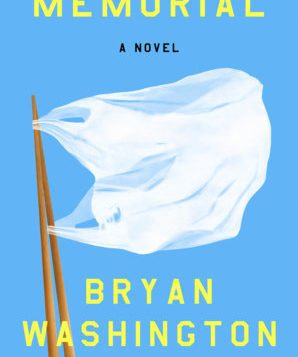 MEMORIAL
MEMORIAL
by Bryan Washington
Riverhead Books. 302 pages, $27.
AFTER READING the short story collection Lot in 2019, I couldn’t wait to read Bryan Washington’s debut novel, Memorial. Lot combined the quirky observational skills of an old soul with a gifted young writer’s zeal for storytelling, people watching, and language. The author’s voice—funny, profane, angry, tender, unblinking—fairly leapt from the page. Would the new book live up to the promise of Lot?
To be sure, Memorial has a lot going for it. Composed as a non-chronological patchwork of short paragraphs and chapters, the novel is less punchy and more downbeat than the short story collection. Washington has described his approach to fiction as “traumedy.”
Memorial centers on Ben and Mike, millennials who’ve been together for four years. They share an apartment in Houston’s multiracial Third Ward. Ben is Black and HIV-positive. Mike was born in Japan to Japanese parents, but has lived in Texas since childhood. Ben works at a daycare center and Mike has a few cooking-related jobs. Both men have parents so terrible that together they paint a dismal picture of their generation. Ben grew up middle-class thanks to his dad’s career as a TV weather forecaster, but his parents split when his father’s alcoholism took over. His mother remarried but paid little attention to her son. Mike’s father abandoned him and his mother when he moved back to Japan.
At the outset of the novel, Mitsuko, Mike’s sharp-tongued, antagonistic mother, flies back to Texas from Japan to visit Mike and Ben just as Mike announces that he’s going to Japan to reunite with his long-absent father, who’s dying of cancer. This leaves Ben and Mitsuko as odd-couple roommates in a one-bedroom apartment. It also sets up a long middle section narrated by Mike in Osaka, where his misanthropic father Eiju has been running a small restaurant that caters to Japanese regulars.
Despite these stunted relationships, this is a novel about family, with the world outside of only secondary importance. The central question becomes, can Mike and Ben stay together despite being raised in families scarred by divorce, abandonment, secrecy, and addiction?
Racism and sexism come into play in a heartbreaking childhood story that Ben recalls. Stopped by a white cop on a family car trip, Ben’s father became irate, swearing at the officer, who promptly handcuffed him. Ben’s mother sweetly managed to defuse the situation, placating the cop and winning the release of Ben’s father as Ben and his sister watched, mortified, from the back seat. Angry and humiliated, Ben’s father refused to talk to Ben’s mom for a month.
While Ben and Mike seem pretty compatible sexually, they quarrel a lot, sometimes viciously. Ben doesn’t want an open relationship; Mike, who’s on PrEP, sleeps with other guys anyway. When Mike asks if Ben thinks the relationship is working, Ben responds angrily, saying: “I think you should just come out and say what you’re trying to say. If you think we’re done, just say it. I’ll pack my shit tomorrow.” Four years in, there seems to be little basis for anything loving or lasting between them.
Then suddenly the lovers are parted when Mike leaves. Ben must adjust to living instead with Mike’s mother, who’s a tough-talking piece of work—both formidable and dismissive. The two slowly bond as she cooks for Ben. They shop together for Asian ingredients. Ben has a brief affair with the older brother of one of his daycare charges.
As Ben and Mitsuko move toward an uneasy détente in Houston, Mike and Eiju do likewise in Osaka. It’s hard to fathom why Mike stays with this spiteful codger for more than a few days. Mike feels a duty to support his father despite the latter’s lack of support for him. He senses push-pull emotions about his Japanese-ness in “this city that I didn’t know, on this fucking island that was both mine … and the furthest thing from anything I’d ever known.”
Within its three sections, it’s very desultory in time and place, layering in snippets of dialog, memories, lists, texts, phone calls, recipes (food is a recurring motif), and even a few black-and-white snapshots. Over time, these pieces produce a pleasingly dark collage. The experience is like finding a thick envelope of related photos and flipping through them as an overall picture starts to emerge.
Washington parts the clouds slightly in the novel’s final section, offering tentative hopeful signs for his ensemble. Ben bright-sides his relationship, recalling each of the few times he and Mike traded “I love yous.” Mitsuko and Mike meet Ben’s family, and it goes amazingly well. Amid tears and revelations, there appears an opening where fractures might be repaired, family could cohere, and love could stay awhile.
____________________________________________________






